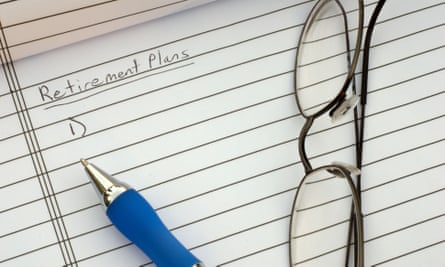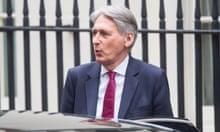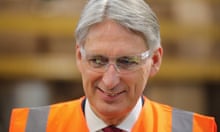On Monday afternoon, the chancellor will present a budget amid the most febrile political atmosphere for years. Brexit uncertainty is at a peak, Philip Hammond needs to find £20bn to meet pledges to the NHS, and the public sector is on its knees after years of austerity. Will he raise taxes, or fund spending from better than expected flows into the public purse? Here’s what we know already, and what the pundits expect when Hammond opens his red briefcase.
Income tax
Currently
First £11,850 is tax-free (the “personal allowance”), then it’s 20% income tax until your income reaches £46,350. Everything above that is taxed at 40%, until you reach £150,000 where the rate hits 45%.
Possible changes
No-one expects any changes to the 20%, 40% and 45% rates. But the Tories have pledged to raise the personal allowance to £12,500 over the duration of this parliament, and raise the starting point for 40% tax to £50,000. Hammond could slow the progress to this target – say by raising the personal allowance just £150 to £12,000 while still promising to meet it by 2020. “Slamming the brakes on further rises towards those targets now would create some room for manoeuvre elsewhere,” says PwC tax expert Iain McCluskey.
What it means to you
Every £100 rise in the personal allowance is worth £20 a year to average earners.
National Insurance
Currently
Employees have to pay national insurance (NI) – notionally for state pensions and the NHS – on incomes above £8,424 a year (£162 a week). You pay it at a rate of 12% of everything you earn. But once you reach an income of £46,384 (£892 a week) then the rate drops to 2% on everything you earn above that.
Possible changes
After last year’s fiasco – when the chancellor abandoned changes to NI on the self-employed just days after introducing them – major changes on NI are unlikely. The Conservatives pledged no increases to NI in the 2015 election manifesto, so Hammond’s room for manoeuvre is strictly limited, with uprating the starting point in line with inflation or earnings the most likely option.
What it means to you
Every £100 increase in the starting band for employee’s NI is worth £12 to average earners.

Pensions
Currently
The basic state pension is £125.95 per week. If you’re saving into a workplace pension, you receive tax relief at either 20% or 40% on everything you put into the plan, depending on how much you earn. The maximum you can pay into a pension in one year and receive tax relief is £40,000, while your “lifetime allowance” is £1.03m.
Possible changes
The state pension will rise by 2.6% under the “triple lock”, so expect the figure to be £129.25 a week. The tax reliefs are hugely costly – worth more than £38bn – so the Treasury might cut back. There has been much speculation about a decrease in the annual allowance to £30,000, or even £20,000. There are also calls to cut or harmonise tax reliefs at 30%, which would benefit less well-paid savers, but it is fiendishly complex and could be politically disastrous among voters in Tory heartlands.
Tom Selby, an adviser at the financial services company AJ Bell, says: “While very few private sector workers would be constrained by a £20,000 yearly allowance, hundreds of thousands of public sector staff would likely be caught – doctors, head teachers and senior civil servants, who might not dream their pension would be worth this amount, risk being hit. If they breached the annual allowance limit, HMRC would claw back any tax relief received above this level.”
Also, look out for any moves to placate campaigners angry at the swift rise in the female state pension age from 60 to 66, and maybe a solution to the long-running battle over pensions to retirees abroad.
What it means to you
The 2.6% rise in the state pension is worth 47p a day. Don’t spend it all at once.

Property taxes
Currently
You pay stamp duty on all property purchases over £125,000, at a rate of 2% on values up to £250,000, then 5% on properties up to £925,000, and 10% above that. If it’s a buy to let or holiday home, there’s an additional 3% tax. Then there’s the complex new regime for taxation of buy-to-let income being phased in, which means landlords can no longer deduct mortgage costs from rental income to reduce their tax bill.
Possible changes
Theresa May has already promised that foreign buyers of properties in the UK will have to pay extra stamp duty to fund a drive to tackle rough sleeping, so Hammond will have to explain how. Meanwhile, he’s under intense pressure to reverse buy-to-let tax hikes, while at the same time doing more to help first-time buyers. One much trailed giveaway is likely to be a reduced rate of capital gains tax for landlords who sell to their tenants. Also look out for new funding for help-to-buy or savings schemes for young adults.
What it means to you
If you’re a non-dom about to throw £100m at a property in Knightsbridge, this is important. For the rest of us, not.
Petrol, booze and fags
Currently
Drivers pay 57.95p fuel duty on each litre of petrol and diesel, a rate that has been frozen for nine years. The duty on a bottle of wine is typically £2.16, while it’s 54p on a pint of beer, and £11.50 on a one litre bottle of vodka. Then there’s 20% VAT to pay on top. Cigarette tax is £4.34 a packet plus 16.3% of the retail price
Possible changes
May has pledged to freeze fuel duty for the ninth consecutive year, so no need to fill up now. The drinks trade is braced for another rise in duty, as it typically goes up in line with retail prices index, which is currently 3.4%. That will add 7p to a bottle of and 26p to a bottle of spirits. Beer could go up by 2p a pint, but there have been many budgets where the duty has been frozen, and with many pubs battling to survive, it could well be frozen again.
What it means to you
The average bottle of wine in a UK supermarket sells for £5.68, so a budget rise will take it to about £5.75.

Environmental taxes
Currently
Since October 2015, shoppers have had to pay at least 5p for each single-use bag, with all retailers in England employing more than 250 people to take part in the scheme.
Possible changes
There is widespread speculation that the bag tax will rise to 10p, with all retailers included. Or maybe the chancellor will take his cue from Ireland, where the tax is 20p a bag, and retailers now generally only offer 70c (62p) bags for life – dramatically cutting the number of carriers shoppers buy. Will Hammond also target coffee drinkers with a latte levy? A committee of MPs has called for a 25p tax on disposable coffee cups to reduce the 2.5bn we throw away every year after just one use.
What it means to you
We now each buy around 19 plastic bags a year at the supermarkets, down from 140 before the charge was introduced. On that basis, a 5p rise in the tax will mean a grand total of £1 more per year. But how much better not to buy them at all; despite the dramatic reduction, we’re still buying 1bn single use throwaway plastic bags a year.
The unlikely candidates for change
VAT, IPT, APD and IHT are all taxes likely to stay much the same in this budget.
VAT is a vast revenue earner for the government, but the standard rate has remained at 20% since 2011 when it rose from 17.5%. No one is expecting a change in the rate, and with “pasty gate” memories still fresh, even changes to what is “zero rated” for VAT are out of the question. Such as the zero rate for VAT on newspapers. Obviously.
Tax on insurance premiums (IPT) has been another winner for the Treasury in recent years, climbing from 6% to 12% on the price you pay for your car and home insurance. Further rises will throw the insurance industry into convulsions.
Inheritance tax rises are politically off limits, with cuts to IHT more likely to be a vote winner. And APD – air passenger duty – may remain frozen as UK airlines gear up for possible Brexit chaos.
Finally, there’s Scotland. Its budget is not until 12 December, and we’ll have to wait until then to see how much more divergence there will be with England on income taxes. Currently, middle and high earners in Scotland pay more income tax than in England, but lower earners pay less.









